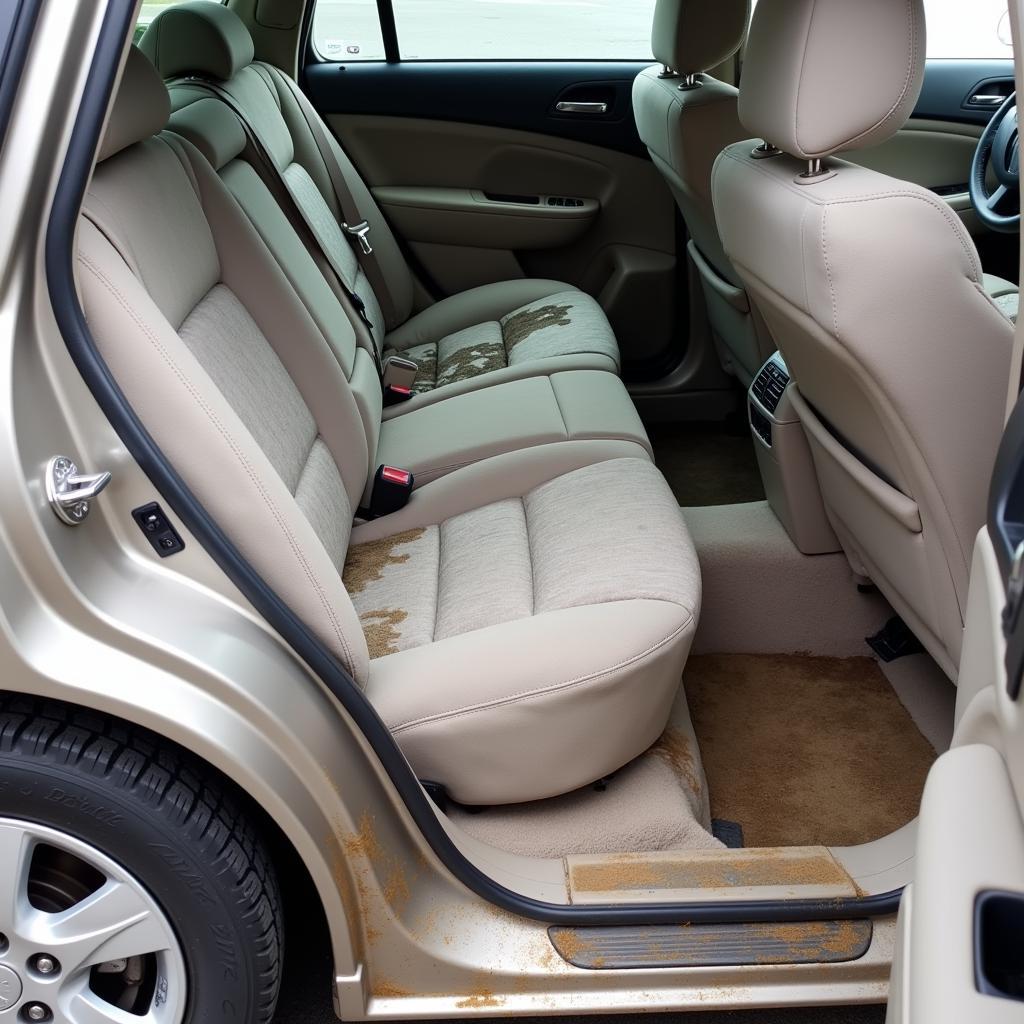The question “Can A Flood Damaged Car Be Repaired?” is complex. While technically, almost any car can be repaired, the real question is whether it should be repaired. Flood damage can be insidious and costly, often hiding extensive problems that can resurface long after the initial repair. Making the right decision requires careful consideration and a thorough understanding of the potential long-term impacts.
Understanding the Extent of Flood Damage
Flood damage isn’t just about how high the water rose. The duration of submersion, the type of water (freshwater vs. saltwater), and the contamination level all play crucial roles in determining the severity of the damage. A car submerged in saltwater for even a short period can suffer significantly more corrosion than one briefly dipped in freshwater.
Hidden Dangers: The Long-Term Effects of Flood Damage
The most obvious damage is often cosmetic – stained upholstery, warped panels, and mud-caked interiors. However, the real danger lies beneath the surface. Floodwater can infiltrate critical electrical systems, corrode wiring harnesses, and damage sensitive electronic components. This can lead to intermittent electrical problems, sensor malfunctions, and even complete system failures down the line. Furthermore, mechanical components such as the engine, transmission, and differential can suffer from water contamination, leading to premature wear and tear and costly repairs in the future.
Mechanical components aren’t immune. Water can infiltrate the engine, transmission, and differential, leading to long-term problems like rust and premature wear. Brake systems are particularly vulnerable to corrosion, compromising safety. Don’t underestimate the insidious nature of flood damage.
Is it Worth Repairing a Flood-Damaged Car?
The decision to repair a flood-damaged car is a complex equation involving the extent of the damage, the cost of repairs, the vehicle’s value, and your risk tolerance. A minor flood, affecting only the carpets and lower door panels, might be a reasonable repair. However, extensive submersion affecting critical systems is often a financial black hole.
Factors to Consider When Making Your Decision
- Repair Costs: Obtain detailed estimates from reputable mechanics specializing in flood damage repair. Be wary of unusually low estimates, as they might not encompass the full extent of the damage.
- Vehicle Value: Compare the repair cost to the vehicle’s pre-flood value. If the repair cost approaches or exceeds the car’s value, it’s likely not a worthwhile investment.
- Insurance Coverage: If your car is insured, contact your insurance company immediately. They will assess the damage and determine whether the car is totaled (deemed a total loss).
- Future Reliability: Even with meticulous repairs, flood-damaged cars are statistically more likely to experience ongoing problems. Consider the potential for future repair costs and the inconvenience of recurring issues.
 Flood Damaged Car Interior with Water Line and Mold
Flood Damaged Car Interior with Water Line and Mold
“Flood damage is often like an iceberg – you only see the tip of the problem. The hidden damage can be extensive and costly to address,” says John Smith, ASE Certified Master Technician at Smith Automotive.
Buying a Used Car: Beware of Flood-Damaged Vehicles
Unfortunately, some unscrupulous sellers attempt to pass off flood-damaged cars as clean vehicles. Be extra vigilant when buying a used car, especially after a major flood event. Look for telltale signs like musty odors, water stains, corrosion under the carpets, and mismatched upholstery. A vehicle history report can also reveal if a car has been previously declared a flood-damaged vehicle.
Protecting Yourself from Flood-Damaged Cars
- Thorough Inspection: Inspect the car carefully, both inside and out. Pay attention to areas where water can accumulate, such as the trunk, spare tire well, and under the carpets.
- Vehicle History Report: Obtain a vehicle history report from a reputable provider, such as Carfax or AutoCheck. This report can reveal past flood damage or other significant events.
- Pre-Purchase Inspection: Have a qualified mechanic inspect the car before you buy it. They can identify potential problems that you might miss.
“A pre-purchase inspection by a trusted mechanic is an essential step when buying a used car. It’s a small investment that can save you from a costly mistake,” advises Maria Garcia, Automotive Engineer and Consultant.
Conclusion
Can a flood damaged car be repaired? Yes, sometimes. But should it be? That’s a more complex question. Weigh the costs, risks, and potential for future problems carefully. Often, walking away is the wisest decision. Remember, your safety and financial well-being are paramount.
FAQ
-
What is the most common damage caused by floods in cars? Electrical system damage and corrosion are the most common and insidious issues.
-
How can I tell if a used car has been flood damaged? Look for musty odors, water stains, corrosion, and inconsistencies in the interior. Obtain a vehicle history report.
-
Does insurance cover flood damage? Comprehensive insurance typically covers flood damage, but not all policies do. Check your specific policy.
-
Should I buy a flood-damaged car at a discounted price? It’s generally not recommended, due to the high risk of long-term problems.
-
How long does it take to repair a flood-damaged car? Repair time varies significantly depending on the extent of the damage, from weeks to months.
-
Can flood damage be completely repaired? While the car might appear repaired, underlying issues can persist and resurface later.
-
Is it safe to drive a flood-damaged car? It can be unsafe, especially if the electrical and mechanical systems have been compromised.
Need more assistance? Check out these other articles on our website: [link to other articles]
For immediate support, contact us via WhatsApp: +1(641)206-8880, Email: [email protected]. Our customer service team is available 24/7.
